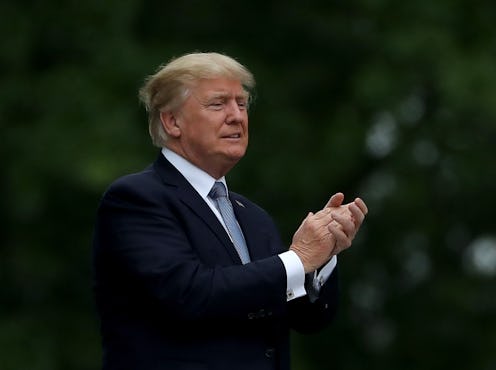News
How Would A Trump Impeachment Impact The 2020 Election?

Mired in controversies, and still less than six months into his first term, President Donald Trump has not had a smooth start to his tenure as commander-in-chief. Much to the contrary — Trump has been one of the most unpopular presidents in modern American history throughout his first several months, and wedged between the Trump-Russia scandal and the congressional GOP's massively unpopular health care bill, there isn't an obvious way for him to turn things around. So, the big question: what would a Trump impeachment mean for 2020, and is considering it even realistic?
First things first, it's important to clarify what impeachment means, and what it doesn't. Although the word is frequently used as a shorthand for Congress removing a president from office, it's actually just the first half of the removal process. Impeachment occurs with a majority vote by the House of Representatives, which then leads to a trial in the U.S. Senate that determines whether or not a president is removed from office.
As such, impeachment in and of itself would not mean the end of Trump's presidency. But it would be an essential first step on that path, and there's no doubt that when many people hear the word impeachment, what they immediately think is "the end of a presidency."
So, what would impeachment mean? Using the precisely accurate definition, it would mean that the Senate would then hold a trial, and ultimately a vote, to determine Trump's fate. The threshold to remove a president is very high, however, and by today's hyper-polarized standards it might be prohibitively high. A full two-thirds of the Senate must vote for removal, and at present, the GOP holds a narrow two seat majority.
Which means, even if the House voted affirmatively for impeachment, there's a very good chance the effort to remove Trump from office would die in the Senate. And if that happened, it would likely render any future discussion of impeachment null and void. Only two presidents have ever actually been impeached, Andrew Johnson and Bill Clinton, and neither of them were removed from office.
Former president Richard Nixon is often wrongly said to have been impeached, a mistake Rep. Ted Lieu recently made on Twitter. In reality, he resigned of his own volition to avoid what was clearly an imminent impeachment and removal.
Moreover, no president has ever been impeached twice. Basically, given the immense time, political energy, and public scrutiny that comes with an impeachment effort ― as well as the anticlimactic bubble-burst that comes if the Senate decides to leave the president in power ― it's the sort of thing that can only be feasibly attempted once, although there's no rule or law that states as such.
And perhaps most consequentially for the 2020 election, a failed impeachment and removal effort could theoretically benefit Trump's popularity in the long term. In the aftermath of the Republican effort to boot Clinton out of office in 1999, his approval ratings actually increased, although that didn't seem to redound to former vice president Al Gore's benefit in the 2000 election.
Of course, if Trump were successfully removed from office ― which again, would surely require many Republican votes in the Senate, and is therefore deeply unlikely ― the impacts on 2020 would be enormous. It would mean, barring some manner of scandal also bringing down Vice President Mike Pence in the next few years, that he'd be the incumbent Republican president running against a potentially stacked Democratic primary field.
It's entirely realistic to think that the Republican Party would be in bad shape if this were the case. Although impeachment and removal is hard to fathom unless the Republican base ultimately turns against him ― something that still hasn't really happened, despite some softening in the degree of support he enjoys among GOP voters ― the Trump base would likely be furious to see its president get the axe.
As such, Pence would likely need to consolidate disaffected Trump loyalists and members of the Republican establishment into a winning electoral college coalition, which sounds like a tough job. Although, considering Trump himself managed to appeal to both of those sides in 2016, it doesn't seem like anything is entirely impossible in the world of Republican politics right now.